Published
- 15 min read
Cloud Computing for Small Businesses: A Complete Guide

Introduction
Cloud computing for small businesses is no longer a luxury. It has become the foundation for growth, agility, and cost efficiency in today’s digital-first economy.
From reducing IT overheads to enabling remote collaboration, the cloud empowers small businesses to compete with larger enterprises on equal terms. Instead of investing heavily in on-premise infrastructure, small companies can now access enterprise-grade tools, storage, and computing power on demand.
Whether you are running a local startup, an e-commerce brand, or managing a growing services team, shifting to the cloud allows you to work smarter, serve customers better, and scale without heavy upfront costs.
The real advantage comes from choosing the right platform that simplifies deployments and controls expenses.
For example, Kuberns makes cloud adoption effortless by handling complex infrastructure behind the scenes while helping small businesses save up to 40% on AWS hosting costs.
In this guide, we will explain what cloud computing means for small businesses, the benefits it delivers, common challenges to consider, and why platforms like Kuberns are redefining how small teams adopt the cloud.
What Is Cloud Computing for Small Businesses?
Cloud computing for small businesses is the use of internet-based servers, storage, applications, and services instead of maintaining costly physical infrastructure.
Rather than purchasing hardware and setting up complex in-house systems, small businesses can rent computing resources from cloud providers and pay only for what they use.
This approach allows companies to access advanced technology that was once limited to large enterprises. It includes services such as data storage, website hosting, customer relationship management (CRM) systems, project management platforms, and advanced analytics.
With cloud solutions, software updates, security patches, and performance monitoring are usually handled by the provider, which means less technical overhead for small teams.
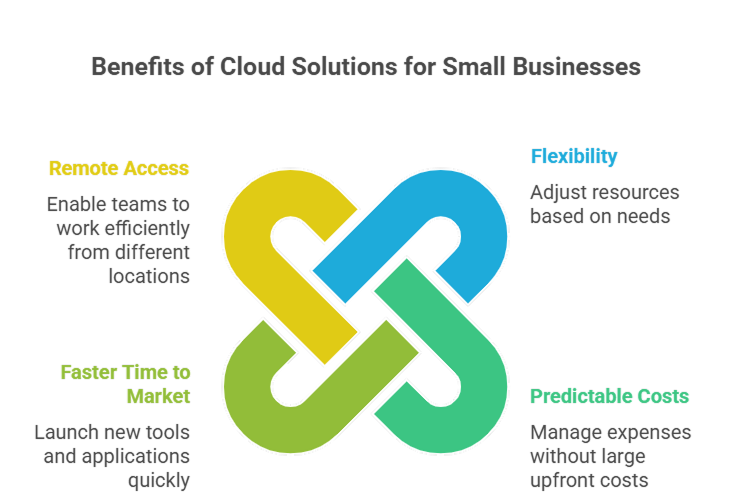 The advantages for small businesses are clear:
The advantages for small businesses are clear:
- Flexibility to adjust resources based on seasonal or project-based needs
- Predictable monthly costs without large upfront capital expenses
- Faster time to market since new tools and applications can be launched quickly
- Remote access for teams to work together efficiently from different locations
Cloud adoption is also directly linked to growth. Companies that embrace the cloud often scale faster, improve customer experiences, and reduce operational risks. To explore this further, see our guide on how cloud-based solutions companies help businesses scale faster.
In short, cloud computing provides small businesses with the same advantages enjoyed by large organizations, but with affordable pricing and reduced complexity.
Benefits of Cloud Computing for Small Businesses
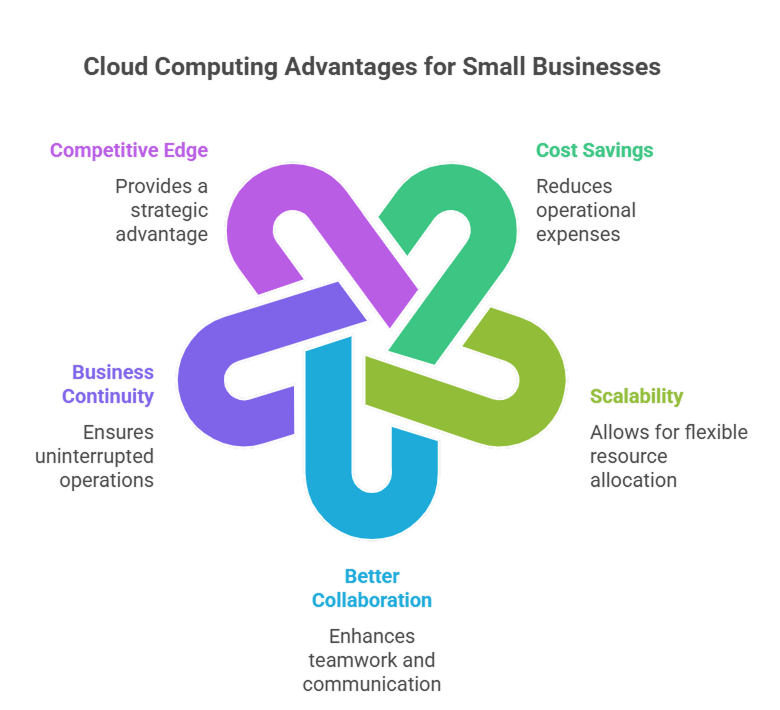 Adopting cloud computing gives small businesses more than just modern technology. It changes the way they operate, grow, and serve customers. Here are the key benefits explained in detail:
Adopting cloud computing gives small businesses more than just modern technology. It changes the way they operate, grow, and serve customers. Here are the key benefits explained in detail:
1. Cost Savings
One of the biggest advantages of cloud computing is the reduction in upfront and ongoing costs. Instead of buying servers, storage devices, and networking equipment, businesses can simply rent resources as needed. This eliminates large capital expenses and reduces the burden of IT maintenance.
With platforms like Kuberns, you can host on AWS infrastructure at a fraction of the cost. Our AI-driven optimization ensures that resources are always right-sized, helping businesses save up to 40% while maintaining high performance and security. You can read more about this in our guide on how to cut AWS bills by 40% without compromising on security or features.
2. Scalability
Cloud services let you scale up or down instantly based on business needs. For small businesses, this means starting lean and expanding quickly when demand rises, such as during seasonal sales or new product launches. With Kuberns, scaling is automated through AI, so you never have to worry about manual adjustments or resource wastage.
3. Better Collaboration
Cloud platforms make collaboration seamless. Teams can access applications, files, and tools from anywhere in the world, enabling real-time communication and shared workflows. This is particularly useful for businesses with hybrid or remote work models. By integrating cloud collaboration tools, small businesses can improve productivity and reduce delays in project delivery.
4. Business Continuity
Unexpected failures, natural disasters, or cyberattacks can bring small businesses to a halt if they rely solely on local infrastructure. Cloud computing addresses this by offering automated backups, disaster recovery options, and high availability. Kuberns ensures that applications remain reliable and secure, even in the face of disruptions, giving business owners peace of mind.
5. Competitive Edge
Cloud adoption is not just about saving money, it is about unlocking new growth opportunities. For example, small businesses using Kuberns can simplify deployment, reduce overhead, and scale applications without requiring dedicated DevOps teams. This makes enterprise-level infrastructure accessible even for lean startups.
The impact of cloud computing on growth has been explored in depth in our guide on how cloud based solutions companies help businesses scale faster, where we explain how flexibility and automation drive long-term business resilience.
Common Challenges with Cloud Computing
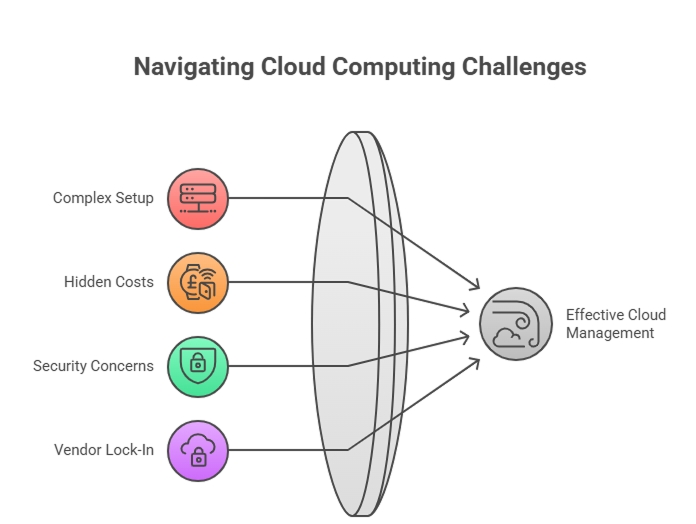 While the benefits of cloud computing for small businesses are undeniable, many owners face hurdles that can slow down adoption or increase long-term costs. Understanding these challenges upfront is important so that you can make smarter decisions.
While the benefits of cloud computing for small businesses are undeniable, many owners face hurdles that can slow down adoption or increase long-term costs. Understanding these challenges upfront is important so that you can make smarter decisions.
1. Complex Setup
Traditional platforms such as AWS and GCP are powerful, but they often require specialized DevOps knowledge to set up environments, configure scaling rules, and manage deployments. For small businesses without in-house technical teams, this can lead to delays and additional hiring costs. A smarter alternative is to use platforms like Kuberns, which simplifies the deployment process into a few clicks. You can see how this works in our detailed guide on what is Kuberns and why it is the simplest way to build, deploy, and scale apps.
2. Hidden Costs
Cloud pricing is usually usage-based, which can create unpredictable bills. Extra charges for data transfer, scaling, or idle resources often catch small businesses off guard. In fact, one of the most common pain points is overspending on AWS. That is why we created a breakdown on how to cut AWS bills by 40% without compromising on security or features, which explains how AI-driven optimization helps keep costs predictable.
3. Security Concerns
Data security and compliance can be overwhelming, especially for small businesses that handle customer information. Ensuring proper encryption, access controls, and compliance with industry regulations can require more effort than expected. Cloud providers often give the tools, but managing them is a challenge. Platforms like Kuberns handle these requirements automatically with built-in monitoring and updates, allowing small businesses to stay secure without adding complexity.
4. Vendor Lock-In
Once a business relies heavily on a single cloud provider, moving to another platform can become difficult due to dependencies on services, APIs, and workflows. This lock-in can limit flexibility and lead to rising costs over time. Many companies looking for options are actively searching for alternatives to platforms like Heroku and DigitalOcean. If this is something you are evaluating, our resources on and explain how you can explore solutions that reduce dependency while improving cost efficiency.
In short, while cloud adoption comes with challenges, small businesses no longer have to struggle with complexity or cost unpredictability. Kuberns addresses these issues with AI-powered deployments, predictable billing, built-in monitoring, and simplified workflows that eliminate the need for heavy DevOps support.
How Kuberns Simplifies Cloud Computing for Small Businesses
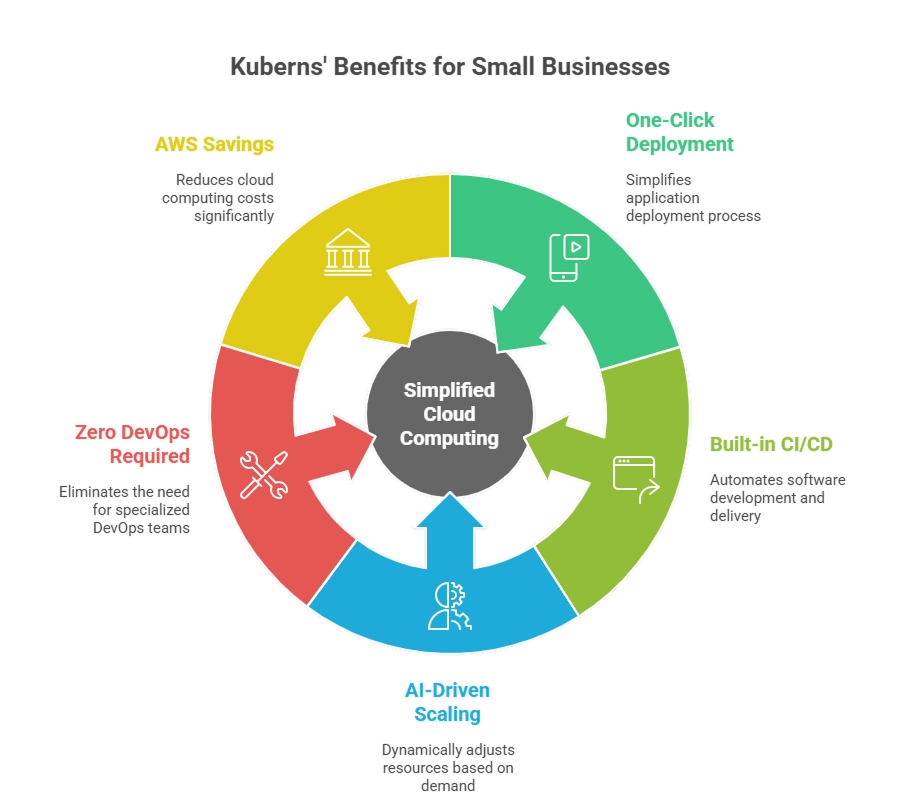 Kuberns is built to remove the complexity that usually prevents small businesses from fully embracing cloud computing. Instead of dealing with manual configurations, hidden costs, and DevOps-heavy workflows, Kuberns streamlines the entire process into a simple and cost-effective experience. Here’s how it works:
Kuberns is built to remove the complexity that usually prevents small businesses from fully embracing cloud computing. Instead of dealing with manual configurations, hidden costs, and DevOps-heavy workflows, Kuberns streamlines the entire process into a simple and cost-effective experience. Here’s how it works:
One-Click Deployment
With Kuberns, you can connect your code repository and launch applications instantly. This eliminates the need to set up servers or write deployment scripts. If you want to see how it works in practice, explore our step-by-step guide on how to implement one-click automated software deployment.
Built-in CI/CD
Continuous integration and continuous delivery (CI/CD) is critical for small businesses that want to ship updates faster. Kuberns comes with a fully automated pipeline, so you don’t need separate tools or complex integrations. Developers can push code, test automatically, and release in minutes. We explain this in more detail in our blog on the easiest way to automate a CI/CD pipeline for fast releases.
AI-Driven Scaling
Most cloud platforms require you to manually configure scaling rules. Kuberns uses AI to automatically adjust resources based on traffic and workload. This ensures that applications run smoothly during peak demand without over-provisioning during low-traffic periods. The result is both performance consistency and cost efficiency.
Zero DevOps Required
Unlike AWS or GCP, where you typically need a dedicated cloud engineer, Kuberns is designed to be simple enough for startups, agencies, and non-technical teams. You can deploy, monitor, and scale applications from a single dashboard without hiring DevOps specialists.
Up to 40% AWS Savings
Kuberns hosts your applications on AWS infrastructure but with AI-powered cost optimization. By pooling and right-sizing resources, Kuberns helps small businesses save up to 40% compared to using AWS directly. To learn how these savings are achieved, check out our guide on cloud cost optimisation.
For example, if your team is currently deploying on Heroku or Render, migrating to Kuberns allows you to not only cut down costs but also overcome platform limitations like restricted scaling, lack of flexibility, and high per-user pricing.
Practical Use Cases of Cloud Computing for Small Businesses
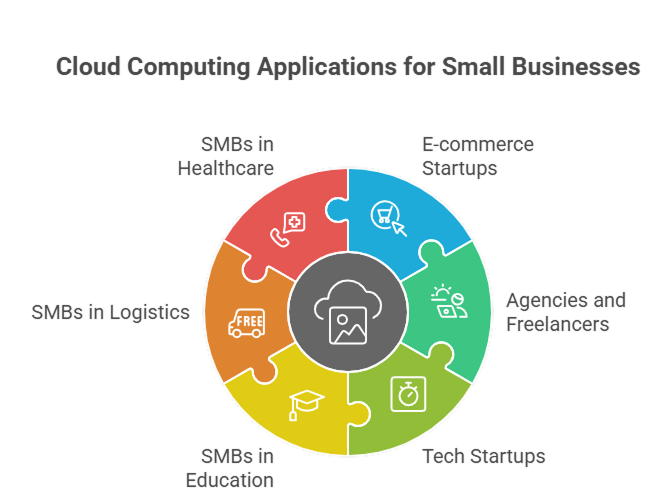 Cloud computing is not a one-size-fits-all solution. Small businesses across different industries use it in unique ways to solve real problems and scale faster. Here are some practical examples:
Cloud computing is not a one-size-fits-all solution. Small businesses across different industries use it in unique ways to solve real problems and scale faster. Here are some practical examples:
E-commerce Startups
Online stores often experience unpredictable spikes in traffic during festive sales or product launches. Managing this on physical servers would require costly over-provisioning. With cloud platforms, scaling happens instantly. An e-commerce startup can keep their website responsive during high-traffic events while paying only for the resources used. Our guide on cloud cost optimisation explains how businesses can handle these spikes without overspending.
Agencies and Freelancers
Agencies and independent developers often juggle multiple client projects at once. Cloud platforms allow them to manage all deployments from a single dashboard, saving time and avoiding errors. With one-click automated deployment, agencies can set up and deliver client projects faster, while maintaining consistency across environments.
Tech Startups
For startups building and testing MVPs (minimum viable products), speed matters more than perfection. Cloud computing allows founders to launch prototypes quickly, gather feedback, and iterate without hiring a full DevOps team. Kuberns simplifies this further with built-in CI/CD automation, making it possible for even small teams to release updates frequently and reliably.
SMBs in Education, Logistics, or Healthcare
Industries like education, logistics, and healthcare rely on secure and reliable platforms to manage sensitive data and run essential applications. Cloud platforms provide compliance-ready infrastructure, automated backups, and disaster recovery options. For example, an education startup can scale to support thousands of students during peak admission season, while a logistics company can use real-time data processing to improve supply chain efficiency. You can also see how cloud-based solutions companies help businesses scale faster in these sectors.
In every case, cloud computing gives small businesses the same advantages enjoyed by large enterprises, but at costs and complexity levels they can manage. With Kuberns, the process becomes even simpler, making cloud adoption practical and profitable.
Conclusion: Choose the Right Cloud Platform for Growth
Cloud computing for small businesses is more than a way to reduce costs. It is a strategy to unlock growth, improve collaboration, and compete effectively with larger enterprises. The real value comes from enabling your team to innovate faster, serve customers better, and scale without the usual technical roadblocks.
Many small businesses struggle with the complexity of traditional cloud platforms or the hidden costs that come with them. That is why choosing the right platform makes all the difference. Kuberns combines the power of AWS infrastructure with simplicity, automation, and AI-driven cost optimisation. You can deploy applications in one click, automate your CI/CD pipeline, scale intelligently, and save up to 40% on hosting expenses.
Instead of spending time managing servers or worrying about cloud bills, your team can focus on building products and growing your business. Whether you are running an e-commerce store, managing multiple client projects, or testing new startup ideas, Kuberns provides a stress-free way to adopt the cloud.
👉 Ready to experience the difference?
Visit Kuberns.com and see how you can build, deploy, and scale applications effortlessly.
Frequently Asked Questions (FAQ)
What is cloud computing for small businesses?
Cloud computing for small businesses means using online servers, applications, and storage instead of setting up expensive in-house infrastructure. It allows small companies to access enterprise-level technology on demand, without heavy upfront investments. You can learn more about how this works in our guide on cloud based solutions companies.
Why should small businesses move to the cloud?
The main reasons are flexibility, cost savings, and scalability. Small businesses can launch new services faster, support remote teams, and avoid downtime during traffic spikes. Platforms like Kuberns make this transition easier by simplifying deployment and helping businesses cut AWS hosting costs by up to 40 percent.
How secure is cloud computing for small businesses?
Cloud computing is generally more secure than on-premise systems because providers handle updates, patches, and data protection. However, choosing the right platform matters. Kuberns offers built-in monitoring and automated scaling, ensuring both performance and compliance without requiring technical expertise.
What are the biggest challenges of cloud adoption for small businesses?
The most common challenges are complex setups, hidden costs, security management, and vendor lock-in. Many companies start on platforms like AWS or Heroku but find them difficult to manage over time. Our detailed resource on explains how to avoid these issues with simpler solutions.
How does Kuberns help small businesses with cloud computing?
Kuberns is designed specifically to remove technical barriers for small businesses. With one-click deployment, automated CI/CD pipelines, and AI-driven cost optimisation, it eliminates the need for DevOps teams. This allows small companies to focus on growth instead of managing servers.
Can a small business really save money with cloud computing?
Yes. By switching to cloud platforms, small businesses avoid upfront hardware costs and only pay for the resources they use. With AI-powered optimisation from Kuberns, many companies reduce their AWS hosting expenses by up to 40 percent. You can see how in our guide on cloud cost optimisation.